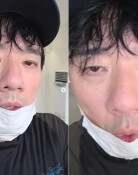[Editorial] Cheong Wa Daes Dubious War On Criticism
[Editorial] Cheong Wa Daes Dubious War On Criticism
Posted November. 12, 2005 08:44,
After returning from her business trip to Washington, presidential public relations secretary Cho Ki-sook posted an article on the official website of Cheong Wa Dae. In the article, Cho accused a reporters column run in a newspaper that criticized her visit to the U.S. as a fiction.
President Roh Moo-hyun posted a reply to the article, saying, Good job. Are you going to tolerate the fiction? Cho replied, I appreciate your encouragement.
To be honest, that makes one think: Like president, like secretary. President Rohs urging of a war on criticism makes one question his quality as head of state once again.
It seems that Cheong Wa Dae has become determined to kick out the media outlets that do not share the same code. The presidential office is keen on investigating into government officials who have an interview with or run an article in a newspaper that is critical of the government. Worse yet, Cho recently threatened, Government officials who do not follow public relations standards of the government can resign. By contrast, the government spares no support for pro-president media outlets, making up for management deficits of the Korean Broadcasting System with taxpayers money. The president even mentioned the necessity of an alternative medium that is inevitably interpreted as a medium that will counter the media outlets critical of the government.
Presidential Candidates are Weary of Cheong Wa Daes Media Code-
Cheong Wa Daes media code also has an impact on the next presidential hopefuls in the ruling camp. Unification Minister Chung Dong-young and Health and Welfare Minister Kim Geun-tae canceled their interview appointment with Dong-A Ilbo, citing doubtful reasons. This could be because they were afraid of the Cheong Wa Dae code.
With such atmosphere in the heart of the administration, government ministries are seeing a growing trend of shunning the media among their officials, from ministers to rank-and-file staff members. North Korean authorities recently banned Seoul Broadcasting System from broadcasting a news clip because a reporter who was covering the reunion of families separated by the Korean War used the expression abductees. They even seized notes of some reporters. However, a Unification Ministry official reportedly urged South Korean reporters to apologize to the North, saying, If we cannot broadcast the coverage because of the Norths hindrances, it is us who will be at a disadvantage. Against this backdrop, it is fair to say that the administrations media code is not just hostile toward critical media outlets but also pro-North Korea.
The problem is that it is the public that bears the brunt of damage caused by the governments erroneous media policy. Two-way communication is most essential to conducting state affairs and establishing a policy agenda in a democratic society. This is because the core of enhancing efficiency and competitiveness is to explain policy to people through the media, receive feedback about public response and criticism, and apply the feedback to policy.
Damage from the Flawed Media Policy is on the People-
A government that only listens to favorable opinions and drives public opinion in one direction inevitably causes a waste of national power. You can take, for example, the relocation of public corporations which the government pushed ahead with even though the media pointed it out as inefficient. The relocation project is facing numerous hurdles such as conflicts among local self-governments and opposition from staff members of public corporations that are to relocate. Furthermore, if the Constitutional Court rules unconstitutional the pending case of building an administrative city, that would mean that tens of trillions of won of taxpayers money were squandered. The government also gave up raising the soju tax and LPG tax and establishing an object tax designed to resolve the low birth rates, after driving forward those policies despite opposing public opinion. All of these are the result of self-righteousness and an arbitrary media policy of the participatory government which ignores the correct function of the media.
Emphasizing healthily tense relations with the media, President Roh recently said, Lets create productive and creative competition. However, the government continues to introduce destructive and unproductive media policies which breed confrontation and conflict. Such behavior of Cheong Wa Dae is anti-public in that the public bears the cost. It is not public relations but propaganda.




![[김순덕의 도발] ‘李부터 연임’ 개헌, 이 대통령은 가능성을 말했다](https://dimg.donga.com/c/138/175/90/1/wps/NEWS/IMAGE/2026/01/16/133172656.1.jpg)


